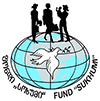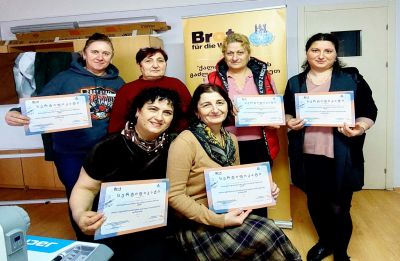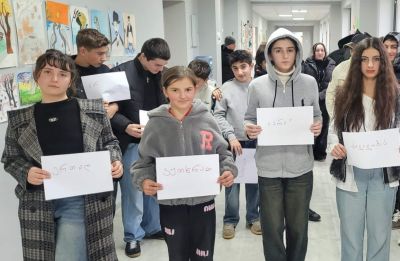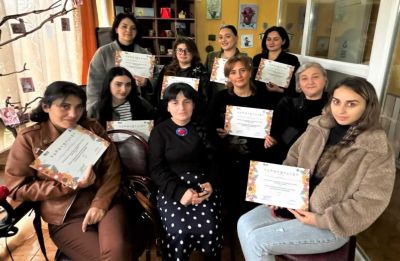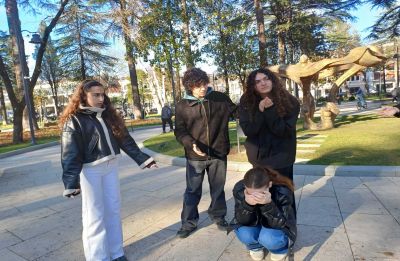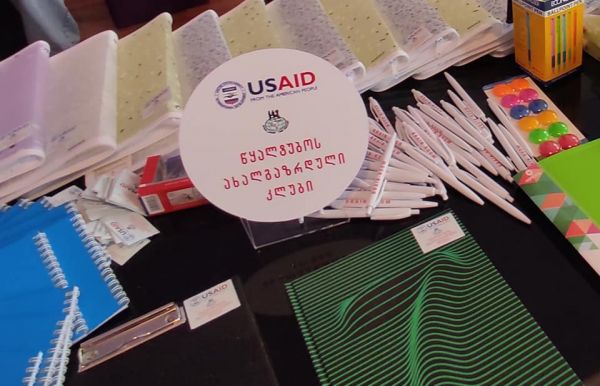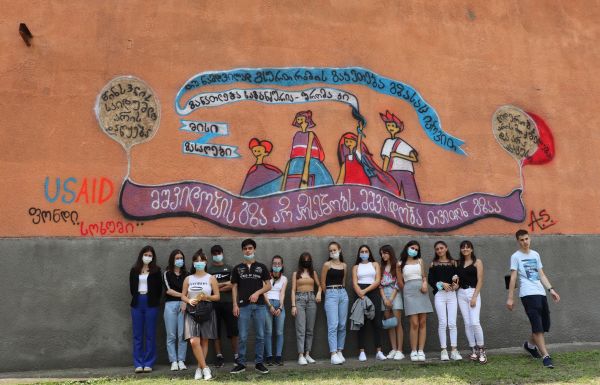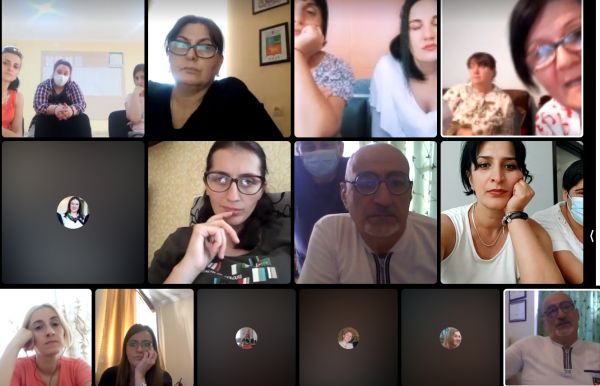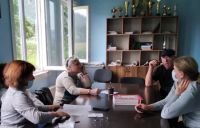Requirement: to carry out installation of external lighting and benches on sports grounds. Koki Women Initiative Group works to address the problems identified in the community. The group members discussed what changes need to be made to the advocacy plan and what resources to include.
Zugdidi Women Initiative Group also continues the advocacy process - the members of the group are trying to clear the area near the IDP settlement from thorns and are acting according to the prescribed plan.
At a regular meeting, members of Koki youth initiative group spoke about the project "Healthy Environment for a Better Future" - how the work was conducted, what results were achieved. This was their project debut and they are very pleased.
“Success of young people begins with such projects”, mentioned one of the group members.
The project is implemented with the support of the USAID
The members of the youth initiative group summarized the work on the project in the eco-club.
The project participants made the following assessment: a new challenge is always useful and informative; teamwork gives a good result - I was convinced of this when working on a project; non-formal education is one of the useful tools for introducing new initiatives; I am ready for new challenges.
Women Initiative Group of the village Pakhulani has successfully completed the advocacy process that began last month. A letter was prepared to the Mayor, signatures were collected, and a majoritarian candidate joined. As a result, the problem was solved - garbage bins were placed in the village. Fund "Sukhumi" thanks Tsalenjikha City Hall for cooperation and support.
The project is implemented with the support of the USAID
September was especially busy for youth initiative groups. Within the framework of the sub-grant program, the youth club at Tskaltybo public school No 4 implemented the project "BRAIN-ROOM - youth space for informing the society".
The project participants developed a thematic painting for the banner, which should become the main attribute of BRAIN-ROOM. Informational meetings were held within the framework of the project. The guests were the representatives of the City Hall and City Council of Tskaltubo municipality. Young people heard information about youth programs, gender issues, social policy of the City Hall. On the basis of the youth club, info-groups were created, which held master classes with older people on the skills of working with the Internet. Project activities were finished, although the discussion space BRAIN-ROOM remains, which is awaiting new guests.
The project is implemented with the support of the USAID
“Interaction in the language of “street art” - this is how the members of Senaki youth initiative group called the project carried out within the framework of the sub-grant program and used the format of street art to communicate with the public. The members of the group developed a thematic model and selected phrases. Then the idea moved to the wall of Senaki Public School No 7. Youth messages call for the need for peace, leadership, education, activism.
Young people organized a public lecture, workshops, invited students from various schools in Senaki.
- What we know about self-government, its structure, programs, budget, what does the decentralization mean - these issues turned out to be interesting for the participants.
The project is completed, although young people will continue to interact with the public through the messages remaining on the wall.
The project is implemented with the support of the USAID
Within the framework of the sub-grant program, Tskaltubo Youth Initiative Group implemented the project “Sustainable Use and Production - Youth for the Implementation of the UN Sustainable Development Goals at Local Level”.
A banner was prepared, thematic comics were printed and placed on the garbage bins, members of the club purchased stationeries.
The project activities were successful. An online survey, trainings, workshops on waste recycling were conducted. The project ended with an action: the club members placed thematic comics on the garbage bins.
The participants believe that the youth project will contribute to improving the ecological and sanitary situation in the municipality, informing the population about the rules for the use and recycling of waste, as well as increasing the self-awareness of the population.
The project is implemented with the support of the USAID
Within the framework of the project “Youth Initiatives for a Healthy Environment” Members of Kutaisi Youth Initiative Group spoke about the progress of the project. They noted that they had the logo of the club ready, T-shirts were ordered, and now they are actively continuing to work on the implementation of the prescribed activities.
As for the women's initiative group, they had online meeting with the deputy head of the service for the development of infrastructure, improvement and cleaning of the city of Kutaisi municipality Karlo Kukhianidze. The members of the group received an answer from a competent person to their questions. The representative of the City Hall promised them to check a number of issues and assist in submission with relevant services.
The project is implemented with the support of the USAID
An online meeting was held with the women initiative group of Khoni municipality, which was attended by representatives of the City Hall. From them the women received information - at what stage is their statement related to the problem they are advocating. According to representatives of the City Hall, the issue is relevant and will be resolved positively.
The second group of women also started advocating the problem. They demand to whitewash the trees in the IDP village. The online meeting with them was attended by Deputy Mayor Manana Gopodze and other representatives of the City Hall. They hope that, with the support of the City Hall, the problem they raise, will be resolved soon.
September was special for Khoni youth initiative group. They are successfully implementing a small project "We love Abkhazia" within the framework of the sub-grant program.
The project is implemented with the support of the USAID
Zugdidi Women initiative groups are working on solution of identified problems. The group of Koki prepared a letter addressed to the Mayor, collected signatures and began the active advocacy for the installation of street lighting and benches near the sports rounds. Zugdidi group began to advocate the issue of cleaning the territory adjacent to the IDP settlement from weeds and thorns.
Within the framework of the Fund “Sukhumi” sub-grant program, Koki Youth Initiative Group is implementing a project “Healthy Environment for a Better Future”. The aim of the project is to establish a healthy lifestyle in the community and school.
The project is implemented with the support of the USAID
The women initiative group of the village Pakhulani (Tsalenjikha municipality) is working on solution of the problems identified in the community. Absence of garbage bins, which creates a difficult situation, was observed. The group prepared a letter addressed to the Mayor, collected signatures of the residents and started advocating.
Within the framework of the sub-grant of the Fund "Sukhumi", the initiative group of the village Lia, is implementing a project "Youth for a Healthy Ecological Environment". An eco-club was created in school. The children began to work on the activities envisaged by the project.
The project is implemented with the support of the USAID
